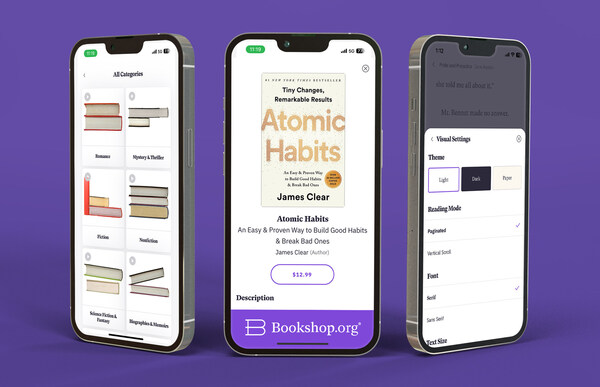Bookshop.org Launches Revolutionary E-book Platform To Support Local Bookstores
Bookshop.org, the online platform championing independent bookstores, announces on its fifth anniversary that for the first time in history, local independent bookstores will be able to sell e-books to their customers. Through Bookshop.org’s e-book platform, indie bookstores can go head-to-head with Amazon’s Kindle apps. Built to bolster revenue streams for brick-and-mortar bookstores, Bookshop.org’s digital books initiative is a monumental addition to its multi-award-winning giveback model and an advancement for the book industry. Empowering local bookstores to sell digital products and earn 100% of the profits from those sales highlights Bookshop.org’s ongoing commitment to supporting local bookstores in the digital age.
Bookshop.org’s new e-book platform gives readers the ability to purchase and download e-books from their favorite bookstores or on Bookshop.org’s site. This innovation unlocks new income channels for authors and booksellers alike. 25% of readers in the US prefer ebooks, yet up until now they had no way to buy them from their local bookstore. The platform, available online via any web browser and through Bookshop.org apps on Apple and Android, launches with a diverse catalog of over three million ebooks, including works from all major publishers, providing something for every type of reader. The app also fosters community engagement by allowing readers to share their favorite book moments on social media.
Launched in January 2020, Bookshop.org has raised over $35 million for independent bookstores in the United States alone. As a certified B Corp, Bookshop.org allocates more than 80% of its profit margin to over 2,200 independent bookstores in the US.
Digitally-inclined readers can directly support the bookstore of their choosing by ordering through Bookshop.org, ensuring the full profit goes to supporting that chosen store. Alternatively, profits from orders without a specified bookstore are distributed among all participating bookstores on the platform, further benefiting the literary community. To learn more about how you can help these communities thrive, visit https://bookshop.org/info/about-us.
E-Learning Market in US to Grow by USD 45.37 Billion (2025-2029)
The global e-learning market in us size is estimated to grow by USD 45.37 billion from 2025-2029, according to Technavio. The market is estimated to grow at a CAGR of 14.1% during the forecast period. Evolved learning and education landscape is driving market growth, with a trend towards advent of advanced technologies. However, competition from moocs poses a challenge. Key market players include 2U Inc., Adobe Inc., Anthology Inc., Articulate Inc., Cengage Learning Holdings II Inc., Coursera Inc., D2L Inc., Docebo Inc., eLearning Co. Inc., Flatworld Solutions Inc., Houghton Mifflin Harcourt Co., iEnergizer Ltd., Infopro Learning Inc., Instructure Holdings Inc., John Wiley and Sons Inc., McGraw Hill LLC, Microsoft Corp, Stylus Solutions Pvt. Ltd., Udemy Inc., and VitalSource Technologies LLC.

The e-learning market in the United States is experiencing significant growth, particularly in sectors like childhood education and K-12 education. Public-private funding and digitalize classrooms are driving this trend. Companies like VIPKID are leading the way with innovative e-learning solutions using digital tools and smart devices. Higher education and test preparation are also adopting cloud-based solutions for cost-effective training methods. E-learning platforms provide interactive learning environments using AI, AR, and VR. However, challenges like inadequate internet access and slow loading times persist. Ongoing efforts to deploy 5G networks and IoT devices aim to address these issues. E-learning market statistics show continued growth, with companies offering remote learning solutions, digital content and standardized training. Vocational programs and corporate learning are embracing AI-based learning and e-learning solutions. Educational institutions are investing in digital learning solutions, including LMS like Blackboard Learn, to enhance teaching and learning outcomes. The future of education and training is in affordable online degrees, such as online MBA, and innovative learning solutions.
The U.S. e-learning market is at the forefront of integrating advanced technologies to enhance educational experiences. Virtual assistants, augmented reality (AR), and virtual reality (VR) are among the technologies being utilized in e-learning products. These innovations have significantly transformed the e-learning landscape. Wearable devices like Google Glass and Oculus Rift, as well as smartwatches such as the Apple Watch, enable dynamic and efficient learning. AR and VR systems and headsets provide learners with customized experiences through simulated environments and roleplay scenarios. This technological integration offers a more engaging and effective learning solution.




